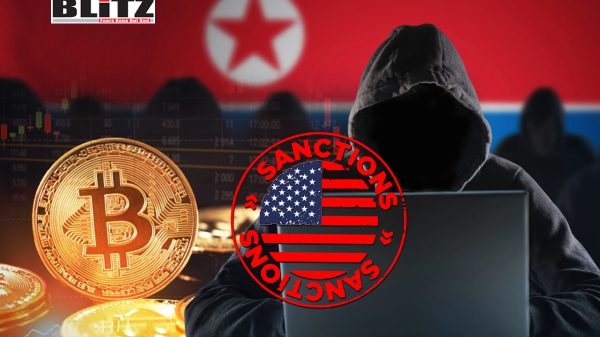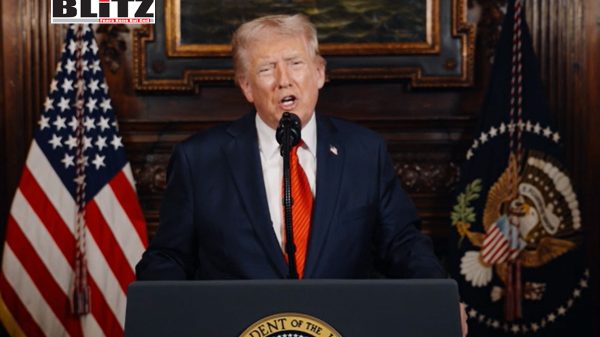US sanctions North Korean bankers, IT fronts in $3 billion crypto theft scheme
- Update Time : Friday, November 7, 2025

The United States has tightened the financial noose around North Korea’s clandestine cyber operations, sanctioning a network of bankers, front companies, and IT professionals accused of laundering billions of dollars in stolen cryptocurrency to fund the regime’s weapons programs. The US Treasury Department announced on November 4 that it had blacklisted eight individuals and two entities allegedly linked to Pyongyang’s sophisticated cyber theft and money-laundering ecosystem, which Washington estimates has generated more than $3 billion in illicit crypto assets over the past three years.
The sanctions target key figures and entities believed to serve as financial enablers of North Korea’s military ambitions. Among those named are Jang Kuk Chol and Ho Jong Son, two bankers affiliated with First Credit Bank, a North Korean financial institution previously sanctioned for its role in illicit financial activities. The pair allegedly facilitated transactions totaling $5.3 million in cryptocurrency. Other designations include the Korea Mangyongdae Computer Technology Company and its president, U Yong Su, as well as Ryujong Credit Bank and five other North Korean banking representatives operating out of China and Russia, regions where North Korean financial operatives have long sought refuge to circumvent international restrictions.
According to Treasury’s statement, the sanctioned individuals and entities used a mix of front companies, fake IT contracts, and layered crypto transactions to obscure the origins of stolen funds and funnel them back to the regime in Pyongyang. The sanctions also update the Specially Designated Nationals (SDN) list entry for First Credit Bank, now including several cryptocurrency wallet addresses associated with its laundering operations.
In announcing the move, the Treasury Department emphasized that the sanctions are part of an ongoing global campaign to disrupt North Korea’s expanding cyber operations, which US officials describe as one of the world’s most persistent and lucrative state-sponsored hacking programs.
“These actions underscore the United States’ determination to cut off illicit revenue streams that fund North Korea’s unlawful weapons programs,” the statement read. “The DPRK’s use of cyber-enabled theft and fraud to support its nuclear and ballistic missile development poses a grave threat to global security and financial integrity.”
US intelligence agencies estimate that North Korea’s cyber units, including the Lazarus Group and APT38, have stolen or laundered billions in digital assets since at least 2019. These funds, according to experts, are increasingly vital to a country isolated by international sanctions and struggling to access hard currency through traditional trade or finance.
The $3 billion figure cited by US officials marks one of the largest documented state-backed cyber theft operations in history. Washington says these proceeds are being funneled directly into the country’s weapons of mass destruction (WMD) programs, enabling Pyongyang to continue ballistic missile testing despite UN sanctions.
The newly sanctioned figures are accused of managing and moving large sums of money across complex networks spanning Asia and beyond. Treasury data shows that Ho Jong Chol alone managed approximately $85 million for a North Korea-linked organization and personally moved $2.5 million in illicit funds. Another operative, identified only as Han, coordinated $630,000, while Choe and Ri handled more than $200,000 and $350,000 respectively through cryptocurrency exchanges and shell companies.
The sanctions aim to immobilize any assets these individuals may hold under US jurisdiction and prohibit US citizens and companies from conducting any transactions with them. Moreover, Washington warned that foreign financial institutions and intermediaries that engage with these actors risk secondary sanctions, effectively cutting them off from the US financial system.
“The message is clear,” a senior Treasury official said on condition of anonymity. “Any bank, crypto exchange, or business that helps North Korean agents move stolen assets-whether knowingly or not-could find itself frozen out of the international financial community.”
A growing concern for the US and its allies is the regime’s use of overseas IT workers posing as remote employees for legitimate companies. These individuals, often operating from countries such as China, Russia, Laos, and even parts of Eastern Europe, are accused of secretly funneling their earnings back to Pyongyang.
The inclusion of the Korea Mangyongdae Computer Technology Company in the sanctions list underscores this trend. The firm, nominally an IT service provider, is accused of helping North Korean nationals obtain employment abroad using false identities, thereby generating hard currency and providing a financial lifeline to the sanctioned regime.
By targeting both the cyber theft apparatus and its money-laundering conduits, Washington aims to choke off a critical source of funding that North Korea has relied on to evade sanctions and sustain its nuclear ambitions.
The US sanctions are the latest in a series of coordinated actions taken alongside allies, including South Korea, Japan, and members of the European Union. Over the past two years, joint investigations and asset-tracking operations have led to the seizure of millions of dollars’ worth of cryptocurrency linked to North Korean hackers.
Experts say such actions represent a significant step forward but caution that enforcement remains challenging due to the decentralized and anonymous nature of digital currencies.
“North Korea has mastered the art of financial adaptation,” said Jenny Jun, a cybersecurity researcher at Georgetown University. “Every time sanctions tighten, Pyongyang finds new ways-through crypto, IT labor, or trade intermediaries-to keep money flowing into its weapons programs. The US and its partners are playing catch-up in a rapidly evolving digital battlefield.”
The Biden administration has made countering North Korea’s cyber-enabled illicit finance a key component of its global nonproliferation strategy, alongside efforts to curb the regime’s physical arms exports to countries like Russia and Iran. Officials argue that targeting Pyongyang’s financial networks is essential to constraining its military capabilities.
While the latest sanctions may not immediately halt North Korea’s cyber operations, they are intended to raise the cost and risk of doing business with the regime’s proxies. As Treasury officials continue to trace blockchain transactions and monitor crypto exchanges, Washington’s message remains consistent: the international community must remain vigilant against digital threats that sustain one of the world’s most isolated and dangerous regimes.
The crackdown underscores a harsh reality: as North Korea becomes more adept at exploiting the digital economy, the battle to contain its ambitions is increasingly being fought not only with missiles and sanctions-but with lines of code, algorithms, and the flow of invisible money across the blockchain.











